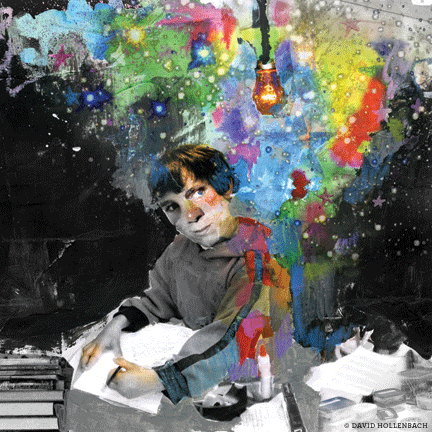
“I needed a room in which I could dream.”
By Nick Lyons | When I sold my little book-publishing business, I searched for a house upcountry with one urgent prerequisite: that it have an office to suit all my needs. I had had many offices. I had dreamed of offices. I was obsessed by offices. From my doctor’s vast corner office, with its inscribed photograph of Bette Davis, who had been his patient, to the shared offices and cubicles that had mostly been my lot, I was fascinated by the shape and size and aura and suitability of all those places where someone worked.
When I finished my Army years and shifted my life dramatically, I moved promptly from my parents’ house in Brooklyn to a miniscule furnished room in Greenwich Village with a lone metal desk, a rusted sink, snot-green walls, and an unobstructed view of the alleyway where a posh restaurant deposited its garbage.
When I taught, the city college kindly allowed me to share a desk with three other professors who had different schedules, and when I first worked in book publishing I began with an open cubicle all to myself. Everyone there heard what everyone else said—to the managing editor, the soon-to-be ex-wife, the girlfriend, Mom, Mom-in-law, even a colleague’s drug supplier. When I became executive editor I inherited an office of my own, with an actual door, but it was always thick with the traffic of such a place, continuous arrivals and departures of authors, would-be authors, editors new and old, complainants of one stripe or another, and with piles of manuscripts, reports, schedules, memos, jacket designs, live galleys, and finished proofs known as foul matter. The door to this office was never closed, while my room in the Village, where I intended to make my last stand, was mine alone, with only the sounds of a neighbor behind thin walls gnashing his teeth because he had lost the love of his life or all of his money, I can’t remember which.
For many years, with a large family in a New York City apartment suited for half of us, I wrote books and articles late into the night on a child’s scruffy desk in the living room, often well past midnight. One of our children to this day thinks that I worked all night: He went to sleep with my Underwood Standard barking loudly in the silence and when he woke I was already back at the desk, before heading to busy offices and classrooms, pecking away.
So when I found a house with a promising private space, I blithely overlooked ceiling leaks in the living room, carpenter ants, and a medieval kitchen. My room—my very own room—was 500 square feet, with a skylight 25 feet up and large wall windows that drenched the interior in morning light. I had bookcases built just the way I wanted them, to hold the 600 or 700 books I most wanted at hand, at exactly the right height. My wife hated the grungy right-angle desk I had used at my publishing firm, but it fitted my needs exactly. I installed 10 of her paintings on the ridge above the bookcases, and added photographs old and new of children and grandchildren to walls where they fit. There was track lighting, enough file cabinets, a few chairs. A hutch held larger books and my CD player, and a couple dozen of my favorite Bach, Beethoven, Mozart, Schumann, Piaf, and other discs. It was a perfectly fine office, and 10 years later it still suits me fine.
But recently I realized that almost all of my thoughts here have been of the textured past, of a life that mostly has already happened. And while I linger in my mind with offices past, I often come back to the first one I ever had.
Like many new teenagers, I had craved a space of my own. My brain aflutter with doubts and dreads, I needed a room in which I could dream, and begin to shape a life far too distant to be more than a faint blur. I had to have time alone. So I converted an abandoned coal bin in our basement into a place for my use only. There was room for one chair and a distressed wood table. Some light crept in from a small, soot-flecked rectangular window close to the ceiling, near the lone hanging bulb. The walls of the bin were rough-hewn pine, discolored by black dust and pocked with indentations made by shovels and coal chunks for generations before the new oil furnace was installed.
The world of Brooklyn was grim and gray. I had thought it would be a brave new bright world after years at a boarding school—those tense years sleeping in rooms with twenty other inmates, my desk my bed—but the school had at least been in the country and there I could fish. I was mad for fishing and adventure. Brooklyn offered only gray sidewalks and gray basketball courts, and the cool gray voice upstairs of my new stepfather, an insurance broker, whose voice turned me to stone. I papered the walls of my office, every inch of them, with bright pages from the outdoor magazines I devoured each month: big trout and bigger salmon, blue rivers, expansive western lakes at dusk, weather-worn outdoorsmen fitted out for bear and great treks.
This was my first office, more than 65 years ago, and it was quite large enough for my wildest dreams then, decorated exactly to my needs, private, mine. I think of it often in my spiffy new space, and how my brain trembled with dreams of what might yet happen.
Nick Lyons W’53, is a former book publisher and English professor.




